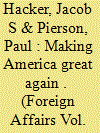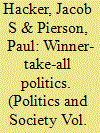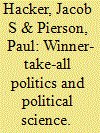|
|
|
Sort Order |
|
|
|
Items / Page
|
|
|
|
|
|
|
| Srl | Item |
| 1 |
ID:
134532


|
|
|
|
|
| Summary/Abstract |
Drawing on the pioneering work of Anthony Downs, political scientists have tended to characterize American politics as a game among undifferentiated competitors, played out largely through elections, with outcomes reflecting how formal rules translate election results into legislative votes. In this perspective, voters, campaigns, elections, and the ideological distribution of legislators merit extensive scrutiny. Other features of the political environment—most notably, the policies these legislators help create and the interest groups that struggle over these policies—are deemed largely peripheral. However, contemporary politics often looks very different than the world described by Downs. Instead, it more closely resembles the world depicted by E. E. Schattschneider—a world in which policy and groups loom large, the influence of voters is highly conditional, and the key struggle is not over gaining office but over reshaping governance. Over the last twenty years, a growing body of scholarship has emerged that advances this corrective vision—an approach we call “policy-focused political science.” In this framework, politics is centrally about the exercise of government authority for particular substantive purposes. Such exercises of authority create the “terrain” for political struggle, profoundly shaping both individual and group political behavior. More important, because policies can be so consequential, they also serve as the “prize” for many of the most enduring political players, especially organized interest groups. The payoffs of a policy-focused perspective include a more accurate portrayal of the institutional environment of modern politics, an appreciation for the fundamental importance of organized groups, a better understanding of the dynamics of policy change, and a more accurate mapping of interests, strategies, and influence. These benefits are illustrated through brief examinations of two of the biggest changes in American politics over the last generation: asymmetric partisan polarization and the growing concentration of income at the top.
|
|
|
|
|
|
|
|
|
|
|
|
|
|
|
|
| 2 |
ID:
167617


|
|
|
|
|
| Summary/Abstract |
Rising inequality is widely seen as one of our most pressing social problems and a focal point for social science research.1 Much of the concern, amplified by the argument in economist Thomas Piketty's Capital in the Twenty-First Century, centers on the prospect that inequality may take extremely durable forms.2 It is not just that some are advantaged or disadvantaged, but that structures of advantage and disadvantage may become more self-reinforcing and cumulative.3 It is the persistence and deepening of inequality that raises many of the most troubling issues.
|
|
|
|
|
|
|
|
|
|
|
|
|
|
|
|
| 3 |
ID:
144609


|
|
|
|
|
| Summary/Abstract |
At a debate [1]among the Republican presidential candidates in March, U.S. Senator Ted Cruz of Texas boiled down his campaign message to its essentials: “Here’s my philosophy. The less government, the more freedom. The fewer bureaucrats, the more prosperity. And there are bureaucrats in Washington right now who are killing jobs and I’ll tell you, I know who they are. I will find them and I will fire them.”
|
|
|
|
|
|
|
|
|
|
|
|
|
|
|
|
| 4 |
ID:
167619


|
|
|
|
|
| Summary/Abstract |
The striking economic agglomerations emerging in affluent democracies are generating, reproducing, and expanding inequalities. A major mechanism for this is housing, which is both a repository for wealth and, under these conditions, a magnifier of wealth. Access to urban areas – the site of educational, labor, and marriage market advantages – is contingent upon access to housing. We use comparative analysis of cases in Europe (London and Paris) and the United States (New York and San Francisco) to consider the capacities of different societies to limit or ameliorate these new sources of diverging opportunity. These seemingly local issues remain shaped by distinct national political contexts, which vary dramatically in their capacity to support local affordable housing and reduce the collective action problems confronting major metropolitan areas.
|
|
|
|
|
|
|
|
|
|
|
|
|
|
|
|
| 5 |
ID:
097815


|
|
|
|
|
| Publication |
2010.
|
| Summary/Abstract |
The dramatic rise in inequality in the United States over the past generation has occasioned considerable attention from economists, but strikingly little from students of American politics. This has started to change: in recent years, a small but growing body of political science research on rising inequality has challenged standard economic accounts that emphasize apolitical processes of economic change. For all the sophistication of this new scholarship, however, it too fails to provide a compelling account of the political sources and effects of rising inequality. In particular, these studies share with dominant economic accounts three weaknesses: (1) they downplay the distinctive feature of American inequality -namely, the extreme concentration of income gains at the top of the economic ladder; (2) they miss the profound role of government policy in creating this "winner-take-all" pattern; and (3) they give little attention or weight to the dramatic long-term transformation of the organizational landscape of American politics that lies behind these changes in policy. These weaknesses are interrelated, stemming ultimately from a conception of politics that emphasizes the sway (or lack thereof) of the "median voter" in electoral politics, rather than the influence of organized interests in the process of policy making. A perspective centered on organizational and policy change -one that identifies the major policy shifts that have bolstered the economic standing of those at the top and then links those shifts to concrete organizational efforts by resourceful private interests -fares much better at explaining why the American political economy has become distinctively winner-take-all.
|
|
|
|
|
|
|
|
|
|
|
|
|
|
|
|
| 6 |
ID:
097828


|
|
|
|
|
|
|
|